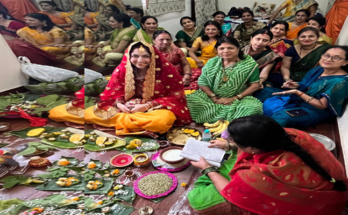 The part that I have always cherished being an educator for the last three decades is interacting with students. Each student is like a snowflake that is unique, unmatched, different and each of them has a bearing which intrigues and inspires. Walking into classrooms is therapeutic for me because it is that fertile space where knowledge is cultivated and minds are enriched. However, in this field, you often come across students with questions that compel you to think what is education? Recently as I walked in one of the Math classes in my school, I noticed a student looking unconvinced about what has been taught. As I approached him, I could sense that he is pretending to hear and understand what the teacher was saying. I asked him to come out and meet me and as I started my discussion with him, I could sense that the teacher has clearly not connected the topic well for children to understand its relevance.
The part that I have always cherished being an educator for the last three decades is interacting with students. Each student is like a snowflake that is unique, unmatched, different and each of them has a bearing which intrigues and inspires. Walking into classrooms is therapeutic for me because it is that fertile space where knowledge is cultivated and minds are enriched. However, in this field, you often come across students with questions that compel you to think what is education? Recently as I walked in one of the Math classes in my school, I noticed a student looking unconvinced about what has been taught. As I approached him, I could sense that he is pretending to hear and understand what the teacher was saying. I asked him to come out and meet me and as I started my discussion with him, I could sense that the teacher has clearly not connected the topic well for children to understand its relevance.
His apprehension about learning Math brings me to address the issue. Why is it that our students are unsure of what they are learning and do not see the relevance of it. The subject that sees a lot of hesitation and reservations is Math. Whether it is learning the Pythagoras Theorem, Trigonometry or even fractions, there is a question mark to its relevance.
While India has a history of great mathematicians; Ramanujan, Aryabhatta, Shakuntala Devi and many others who have contributed in a large way to the subject, there is a huge percentage of students who struggle with the subject. It has been deemed as a subject that is comprehensible to only the ‘bright minds’ mainly because the level of difficulty is high compared to other subjects. Research and polls conducted by various agencies have also confirmed that Maths, as a subject, came out on top of the difficulty chart. This is not surprising.
It takes a lot of patience and persistence to grasp the basic concepts of mathematics.
Hence as the leader of my institution at GIIS Chinchwad, we actively strive to introduce methodologies that make the subject fun and practical. We involve a lot of real-life objects and daily experiences such as buying vegetables, setting a table, solving Rubik’s cube, playing with a deck of cards and more as ways to teach the basics of Maths and have fun while building a strong foundation.
Presenting real-life problems catalyzes the decision-making and problem-solving abilities of the brain. A child’s brain is sharp and their brain activity levels change while taking on math problems. Thus, inculcating the habit of solving trivial mathematical problems since early days helps in sharpening the brain further.
Games and activities like Snakes and Ladders, Hopscotch, Number lines form the basis of our curriculum delivery for primary years. Role play through market activity, setting up a grocery store, running a restaurant and creating a business focuses on the art of transaction and negotiation that helps to understand numbers in a more definitive and realistic manner.
While maths might seem like a purely formulaic pursuit, the patterns and ratios such as symmetry, geometry, and measurement are involved in creating beautiful art, where many artists take advantage of mathematical findings, such as the golden ratio to make their artwork beautiful and realistic. I am of the strong opinion that Math is a beautiful subject that cannot be negated. The Fibonacci sequence or as they saw the law of proportion in nature also involves shapes and sizes that form the basis of geometry in maths. The fact that Math is not seen as a threat at GIIS Chinchwad is vindicated by the results of the Inter GIIS Math Quiz where 7 GIIS schools of India come together for a Math quiz. GIIS Chinchwad has been winning this quiz for the last three years and our students have done us proud.
Acquiring concepts and applications of trigonometry, abacus, probability, and statistics not only helps the brain develop one’s proficiency in critical thinking, problem-solving and analytical thinking but also helps use these skills in everyday life. Abacus is one of the simple calculating tools which are designed in such a manner so that the brain visualizes while performing calculations. A lot of our students at Primary level have done the school proud by emerging as champions at State level ABACUS Competitions.
In a nutshell, mathematics forms the foundation of every little thing that we do. The quality of education can be dramatically improved provided we focus on fundamentals and concepts. It is clear that the importance of mathematics in education has grown over the past years to glaring heights. And being an era where skill development, technological developments, and innovations are highly regarded, the more mathematical we are in our approach, the more successful we will be. By making maths fun and absorbing since the early stages of a student’s education, the concepts can be effectively drilled into the young minds. As a result, this will pave way for future success.
(By Dr. Amrita Vohra, Principal, Global Indian International School, Chinchwad)



